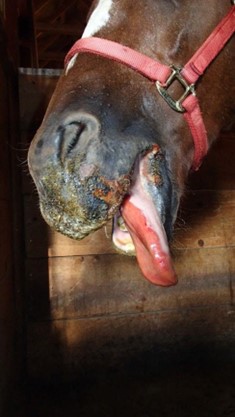 Update May 23, 2023: Quarantines have been imposed by the U.S. Dept. of Agriculture on 15 properties in San Diego County and 4 in Riverside, Locally, 6 cases have been confirmed and 9 more are suspected.
Update May 23, 2023: Quarantines have been imposed by the U.S. Dept. of Agriculture on 15 properties in San Diego County and 4 in Riverside, Locally, 6 cases have been confirmed and 9 more are suspected.
Read more: https://www.eastcountymagazine.org/quarantines-imposed-vsv-livestock-dis...
By Miriam Raftery
May 20, 2023 (San Diego’s East County) – A case of Vesicular Stomatitis Virus (VSV), a viral disease which causes severe blister-like lesions on the mouths and hooves of horses, cattle, pigs, goats, llamas, and other hooved livestock, has been confirmed in San Diego County, according to Dr. Craig Chandler, DVM, at the East County Large and Small Animal Practice. According to Dr. Chandler, testing is underway on samples from several other horses in East County with suspected VSV.
According to the American Association of Equine Practitioners, VSV is contagious and debilitating, but rarely life threatening. It can also spread to humans, so safe handling procedures should be followed.
The disease is reportable; livestock should be isolated for 14 days after the last case. The disease takes 2 to 8 days from exposure to appear and usually runs it course in about 2 weeks, though sores can take up to months to resolve. Testing is required to confirm presence of the disease.
Dr. Chandler posted the following information on Facebook and gave permission for ECM to reprint it, along with a photo:
Update on Vesicular Stomatitis Outbreak:
ATTENTION HORSE AND LIVESTOCK OWNERS
NEWS UPDATE:
On May 17, 2023, the National Veterinary Services Laboratories in Ames, Iowa, confirmed a finding of vesicular stomatitis on an equine premises in San Diego County, California.
In addition to this confirmed case, samples have been submitted from multiple horses in East County with suspected VSV. These results are still pending.
Vesicular Stomatitis Virus affects livsetock including horses, cattle, swine, goats, sheep, llamas, alpacas. The virus causes blister-like lesions to form in the mouth and on the dental pad, tongue, lips, nostrils, hooves, and teats. These blisters swell and break, leaving raw tissue that is so painful that infected animals generally refuse to eat and drink and show signs of lameness. Severe weight loss usually follows. In horses, vesicular lesions generally occur on the upper surface of the tongue, the lips, the corners of the mouth, and the gums, as well as around the nostrils. The lesions in horses may also appear as crusting scabs on the muzzle, lips, ears, coronary bands, sheath, udder, or ventral abdomen.
What to do if your livestock animal (horse/cattle/swine) presents with clinical signs of VSV:
- Use gloves if examining the oral cavity of your horse/cattle or feet of affected swine
- Call your veterinarian. They can assist with assessment, supportive care and inform you if your animal needs to be tested.
- Do not travel with or re-locate your livestock animal, unless a veterinarian has cleared you to do so.
- Isolate your animal from other horses and livestock until a veterinarian has directed you otherwise.
- Avoid unnecessary human to suspect animal contact.
How is it spread?
Biting insects, animal movements, and moving the virus on objects are all factors. The most common method of transmission is through biting insects. Once the disease is introduced into a herd, it may move from animal to animal by contact or exposure to saliva or fluid from ruptured vesicles. Humans can contract vesicular stomatitis by coming into contact with lesions, saliva, or nasal secretions from infected animals. In people, the disease causes an acute influenza-like illness with symptoms such as fever, muscle aches, headache, and malaise. To avoid exposure to this disease, individuals should use personal protective measures when handling affected animals
What to do if there is a confirmed or suspected infection at the location where your horse/cattle/swine resides:
- Prevent direct contact with affected animal
- Use as many fly control measures as possible (feed through IGR such as simplify or solitude, fly spray, fly predators, manure removal, fly masks that cover ears, fly sheets, fly boots, etc.)
- Properties will likely be quarantined (no in or out movement for 14 days since onset of clinical signs - with each subsequent affected case the 14 day count starts back over).
- DON'T PANIC
How do I prevent my animal from getting Vesicular Stomatitis:
- FLY CONTROL!
- There is currently no vaccine available for VSV
- Avoid common water or feed troughs to help prevent spread.
- Clean common surfaces with accelerated hydrogen peroxide or commercial disinfectants that contain chlorine bleach (0.645%). Sunlight is known to kill VSV
- Avoid pasture grazing (increased insect exposure)
Can I still travel to horse shows?
- Minimizing movement of horses will help contain this disease.
- The show managers and state officials are able to decide if they will allow horses from affected counties to enter premise/state. Please consult with your veterinarian prior to travel.
- Stabling facilities may decide to go into lockdown (no in or out movement) even if there is not a suspected case on the premises, in order to prevent excessive exposure.
- If a horse is suspected positive at a horse show, the horses on premises may be subjected to quarantine on site for a minimum of 14 days.







Recent comments